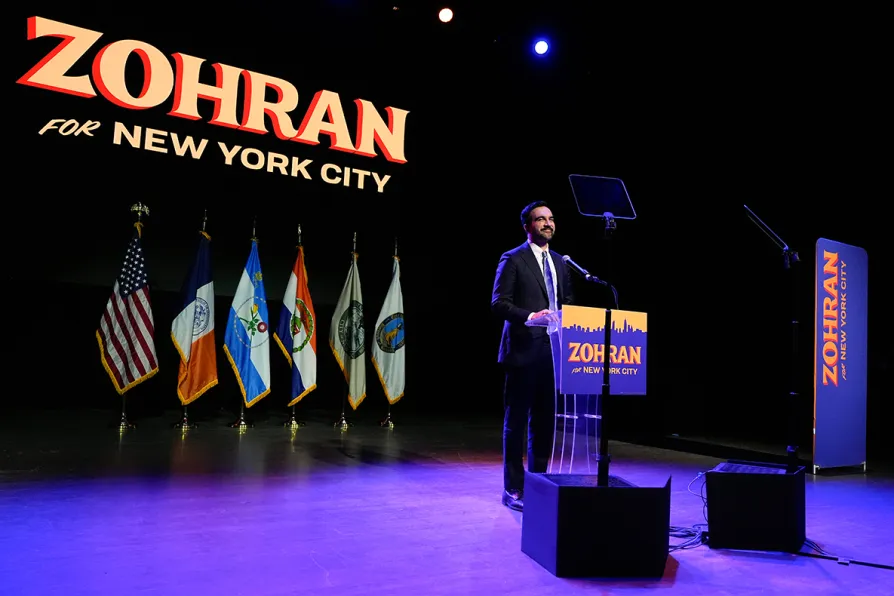
 Zohran Mamdani speaks after winning the mayoral election, in New York, November 4, 2025
Zohran Mamdani speaks after winning the mayoral election, in New York, November 4, 2025
THE stunning electoral victory of Zohran Mamdani — running on a socialist platform — has transformed politics in New York.
The New York Daily News, so rabidly right-wing that it makes the toxic titles of Britain’s billionaire media look relatively liberal, has marked the new mayor’s victory with a front page mock-up that shows the victorious candidate brandishing a hammer and sickle.
And a much diminished Donald Trump, who has won and lost his fascist father’s fortune in the New York real-estate market, threatens to pull federal funding from his home town.
Mamdani won against not only the Democratic Party leadership, who put up former governor Andrew Cuomo against him despite winning the primary election, but also the Republican candidate.
Progressive opinion both sides of the Atlantic senses that the victory of an enthusiastic socialist running on a radical programme has a wide significance. Where this election result is seen as a problem is in the leadership circles of the Democratic Party and the Establishment elements of our Labour Party.
For these right-wing tendencies in Britain’s Labour Party, the political system in the US is an object of veneration. For the politically ambitious who desire the embrace of Westminster Labour, an apprenticeship on a US election campaign and a CIA-sponsored study tour are early career markers of the fledgling opportunist.
Like the leading circles in the Democratic Party our Labour right wing is most comfortable with a politics in which two parties, broadly committed to the continuity of the capitalist system, alternate in power with their essential similarities obscured by rhetoric and style.
That model is eroding faster than a Rachel Reeves tax promise.
The distinctive feature of the Mamdani campaign is the electoral dynamic which saw a massive mobilisation of working people with a section of the Trumpian base responding to Mamdani’s focus on the cost of living, jobs and welfare.
The significance of this for British politics is obvious.
The latest opinion polls have the upstart Reform UK running away with Tory votes and a chunk of people who might more usually vote Labour.
The Caerphilly election showed how savvy voters are in spotting the best way to block Reform UK.
This tactic has some utility but it is not sufficient. Given that the Reform UK electorate is far from being a monolithic block of people with a common ideological position but, in fact, is highly fragmented and contains many looking for an alternative, an important political priority is to fragment it.
That this cannot be done by the kind of consensus politics which is the failing strategy of Establishment politicians is transparently obvious.
Electoral politics is in flux and it is important that a rough and ready unity emerges that provides the best prospects in each constituency for advance.
The early promise that the fledgling new left party might be the decisive element in catalysing a new political landscape has been compromised to a certain extent. The promise of a radical departure in politics has been most profitably seized upon by the Green Party, which has harvested some of the enthusiasm that Zarah Sultana and Jeremy Corbyn’s initiative generated.
That real advance must be grounded in the mass movements against war, austerity and solidarity shows just how important it is that the new left party gets organised at local and industrial level.
A decisive political breakthrough that encompasses every necessary element in fashioning a model of popular sovereignty and working-class progress means finding ways for left-wing Labour folk, trade unions, Greens and socialists to find a rough unity in action. A united front, in fact.










